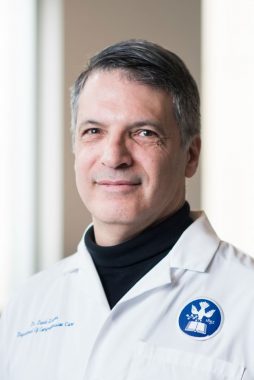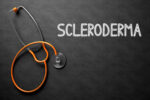Managing the Effects of Scleroderma on Dental Health
Written by |

Between dry mouth, gum disease, cavities, and tightening of the mouth, scleroderma can make dental care extra challenging.
David M. Leader, DMD, MPH, is an expert on dental health and scleroderma, and a longtime supporter of those with the condition. He is the director of the Emergency Clinic and an associate professor in the Department of Comprehensive Care at Tufts University School of Dental Medicine in Boston, and has spoken at multiple scleroderma conferences and workshops.
I spoke with Dr. Leader to learn more about dental health and scleroderma. Excerpts of our phone and email conversations follow, with light editing for clarity.
DCW: How did your interest in scleroderma begin?
DL: I first treated a patient who had scleroderma when I was a student at Tufts University School of Dental Medicine in 1983. Her case was challenging for a dental student, but in retrospect, not a particularly difficult situation considering her diagnosis.
In 2005, I was asked to speak at the Scleroderma Foundation’s national conference in Cambridge, Massachusetts. I was asked to teach the members of the scleroderma community what they needed to know about oral health. I did that, and in the Q&A after, the audience informed me that many patients find it difficult to locate a dentist who feels that they have the requisite knowledge to treat a patient with scleroderma. That was a serious and intriguing problem that interested me. Since then, I have worked to educate dentists and patients.

Dr. David Leader. (Courtesy of Alonso Nichols and Tufts University)
Tooth loss is a major concern for scleroderma patients. In deciding on tooth implants, what are some issues we should pay extra attention to?
Implants appear to be a good choice for many people who have scleroderma. The surgeon who places the implant and the restoring dentist who will put teeth on the implants should consider if the teeth were lost due to osteolysis (in scleroderma, cells may dissolve the hard tissue of the upper and lower jaw, the jaw joint, and the teeth). [If so,] bone in that area may not retain a dental implant. Microstomia (limited mouth opening) limits the ability of dentists to place implants into bone and restore them with crowns or dentures. Some medications, such as bisphosphonates (Boniva, Fosamax, and more) interfere with the ability of the bone to knit to dental implants.
What are common dental issues in scleroderma patients, and how can we treat them?
For dry mouth, use fluoride toothpaste, professionally applied fluoride varnish, medications including Salagen and Evoxac, [and] suction of the salivary ducts by dentists and dental hygienists.
For tooth resorption (when the cells of the body eat away the teeth, like when the roots of baby teeth are eaten away and the teeth fall out), there is no treatment. When the tooth is lost, it may be replaced.
Periodontal (gum) disease and caries (tooth decay) are the same, albeit more common for patients who have scleroderma, and are treated the same.
What should dentists know when treating a scleroderma patient?
Most patients who have scleroderma have xerostomia (dry mouth) and need treatment for that.
When the patient can’t open, it is not that they do not want to open. The patient may do exercises to improve their ability to open. Dentists may feel that a patient who does not open fully does not trust them. Microstomia makes our work very difficult and uncomfortable for the patient. It’s important to keep up with regular oral exercises.
The patient will need adaptive devices for home hygiene. Ask your dentist or dental hygienist to demonstrate how to brush using the electric brush and [use] adaptive flossing devices such as a floss fork.
Scleroderma may cause bone resorption and tooth resorption. Attempting to treat tooth resorption with expensive and time-consuming treatments (such as root canal treatment, crowns, periodontal surgery) will be disappointing for the patient and the dentist.
Widening of the periodontal ligament is common in scleroderma. This is not periodontal disease. Do not treat this condition.
What new and innovative therapies and treatments are coming up?
Therapies are better now than in 2005. There are new ways to treat tooth decay and to restore missing teeth. Unfortunately, there are no treatments on the horizon for tooth and bone resorption.
What advice do you have for a newly diagnosed scleroderma patient?
See your dentist regularly, at least twice a year. Have a panoramic dental X-ray image and bite wing images taken every year. Use a fluoride toothpaste. Ask your dentist and dental hygienist for professional fluoride treatments with every checkup. Speak with your rheumatologist and your dentist if you feel that your mouth is often dry. Use a rechargeable electric toothbrush with a small head. Further information is shared on the Scleroderma Patient-centered Intervention Network.
***
Note: Scleroderma News is strictly a news and information website about the disease. It does not provide medical advice, diagnosis, or treatment. This content is not intended to be a substitute for professional medical advice, diagnosis, or treatment. Always seek the advice of your physician or other qualified health provider with any questions you may have regarding a medical condition. Never disregard professional medical advice or delay in seeking it because of something you have read on this website. The opinions expressed in this column are not those of Scleroderma News or its parent company, Bionews, and are intended to spark discussion about issues pertaining to scleroderma.








Janette Acevedo
I appreciate the advice. It is difficult to find a dentist that knows about scleroderma.
Elizabeth Levy
Thank you for this vital information, Ms. Watkins.
This is quite a game-changer for me--and I'm guessing every other person with diffuse systemic scleroderma who reads this article. I'm able to put more things in my life together concerning dss! For instance: I knew I had heart problems when I was a child because I could never keep up with the other kids (running, riding bikes, physical ed. in school, etc.) and my heart would feel like it was blowing up in my chest and I couldn't breathe anymore, and my body just wasn't able to move, so I had to stop, and keep from collapsing as best I could.
When I was 14, I stopped being able to process food normally, the way my body had always done. Now everything just piled up in my stomach and sat there for days. I'd be hungry and couldn't eat (told I was anorexic because I couldn't eat) or when I made everyone around me happy and ate, I'd have to throw it up because there was just no way to function with food sitting around in my stomach and up my esophagus for days at a time--so then I was called bulimic. This was a vicious cycle and has impacted my entire life...my well-being, my self-judgement, my shame...the stuff has piled on me because I always believed what I was told...that it was my fault, that I had self-loathing, that this was all a mental "sickness" and it was all my fault.
My bile ducts began blowing up on either side of my head at this time, as well--which made me look like I had cantaloupe-sized balls sticking out of either side of my head, and hurt like crazy. I looked absolutely scary, and was in terrible pain from this, and no one could tell me why this occurred or what could help me with this.
With the recent articles about the chronic constipation and the slow colonic transfer: http://sclerodermanews.com/2021/09/21/study-finds-risk-factors-chronic-constipation-slow-colonic-transit-ssc-patients/?utm_source=SCL&utm_campaign=59757665b9-SCL_ENL_3.0_US&utm_medium=email&utm_term=0_8741067e1d-59757665b9-71494317 (Btw, the 'Caring Conversation with my Colon...' doesn't ease my scleroderma pain...)
Your article and the one I placed a link to, have been a HUGE eye-opener for me, and I'm sure for most others with scleroderma.
Bless you for writing this article--and bless Dr. David Leader for all his work and sticking with it!
I am grateful beyond measure.
Dinah Chong watkins
Thank you for reading the the article. I think for most of us with scleroderma, our GI issues affect our quality of life most. Finding a really good, informed and GI doctor is key. I’ve found when bloating gets really bad, a dose of Miralax will clear it up, good luck.
HelenGinalisa Rizio
I had everything kind of work up but nothing is working a few implants have stayed up to now I’m 72 years old
mo godek
For two years I have had oral discomfort. I have lost 30 lbs and force myself to eat. It is primarily my tongue that becomes irritated and inside of my cheeks. I'm eating and drinking all foods at nearly room temp - no extreme hot or cold, no spicy food. I have been on gabapetin and while it has helped somewhat, I dread eating due to the pain associated with it.
Help - does anybody have any suggestions. Thank you in advance. I was diagnosed 2 years ago, reynauds started about 3 years ago.
Dinah Watkins
Hi! I’m so sorry to hear about your situation. It must be very hard on you physically and emotionally. Does Tylenol 680 mg tablets help with the pain? I take the protein shake Ensure or Protein Plus for extra calories, it’s easy and fast. I hope your rheumatologist can help you, if your symptoms are getting worse you may look into Analogous Stem Cell transplants, the window for this is within the first five years of diagnosis
Ellen M Merriken
any advice about botox for facial lines around mouth? I, too have lost most of my teeth am currently wearing dentures on top and partial on lower, needing last 2 teeth pulled that secure partial. Have little or no bone left and possibly will need implants? suggestions, advice or recommendations just needing to hear what others have done
mary mc fadden
I am a 84 year old female with scleraderma for 24 years. I have pulmonary hypertension, calcium deposits on my elbows, my fingers break out with sores and I have a mitral valve that has been affected by the collegen buildup. Never the less I fight on. But now I have been told by my dentist that I need teeth pullled and implants inserted and then a bridge--all for around $8000.. I am concerned about the implants and the long term ( 5 years ?) outlook for my dental issues. Any advice here greatly appreciated.
Carol montagano
I have a child with a brain injury and scar adder a can’t find a dentist to work with her because of scaraderma her teeth are rotting she had care until her mouth got small I live in New Jersey please help she only functions on a three year leval and is now 48 thank you